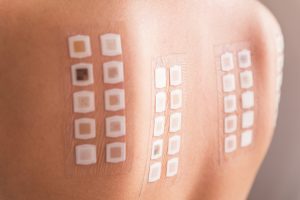The Truth About Allergy Skin Testing: Can It Help You Find Relief?

Do you believe that you may have an allergy? Do you notice general allergy symptoms but can’t seem to figure out what the allergy is? Or do you have a pretty good idea of what the allergy is and you simply want confirmation? Whatever the situation is, one thing is true: Treatment for allergies beings with confirming what the allergy is.
If you’ve been wondering about your allergies then an allergy skin test may be the right option for you. There are many options available at Allergy, Asthma, and Immunology Medical Group. To learn more about them, please read on or call us at 805-658-9500 to set up an appointment at your convenience. We are here to help you through this difficult time.
Trust our expert interpretations
Of course, the results of the allergy skin tests are only as good as those who interpret them. you can trust that our allergists will properly interpret your results so that we can come up with the most effective treatment plan. Note that the skin test is not a new option: It’s been used by allergists since 1860. That said, today’s methods are updated for today’s needs.
A skin test is fast, it’s non-invasive, and it’s reliable so long as it’s done by a professional who’s been properly trained. Our tests can tell us if you have hay fever allergies (such as an allergy to dust or pollen), food allergies, pet dander allergies, allergies to bee stings, allergies to mold, or medication allergies.
What to expect on the day of your allergy testing
This is a test we can perform right in our offices and the results can be available as quickly as within 15 minutes. At Allergy, Asthma, and Immunology Medical Group, we work with two main types of allergy tests. They are prick testing and intradermal testing. Either way, the testing involves taking a diluted allergen and introducing it into your skin. This allows the doctor to find an allergic reaction. Both of the tests are essentially painless.
The skin prick test involves pricking the skin with a pin and introducing the allergen, while an intradermal test involves injecting the allergen right below the skin surface with a needle. With either type of test, the allergist then looks closely for signs that there is an allergic reaction. This may involve a small hive or a bump. The size of that hive or bump also tells the allergist what they need to know about how sensitive a person is to an allergen. The bump then generally fades quickly and there are typically no other side effects.
What to expect after your allergy test
Once we’ve completed the allergy testing, we’ll use the results coupled with your medical history and symptoms to come up with the best treatment path. We can also give you detailed information on specific preventative measures you can take to avoid the allergen in the future. If you have allergies – or believe you may have allergies – and are ready to take back your life, reach out to Allergy, Asthma, and Immunology Medical Group at 805-658-9500 today to make an appointment.



